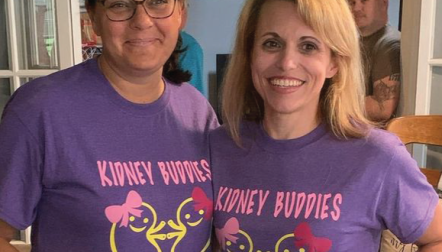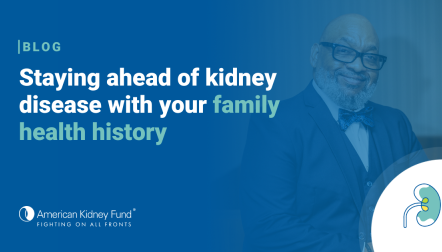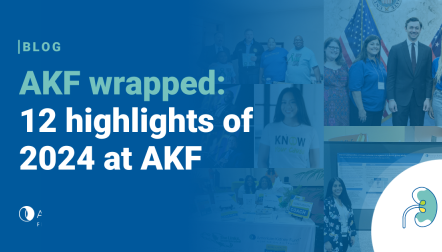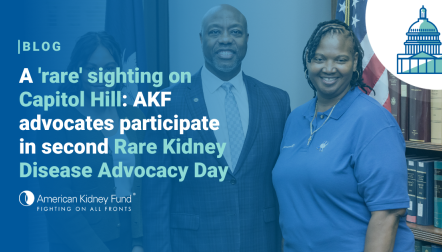
Blog post
AKF's 2020 advocacy year in review

Last year was full of surprises for all of us — we had to adjust to a new way of life, continue our work to protect the most vulnerable in our communities and quickly adapt to situations far outside our comfort zones. The pandemic brought to light many issues those of us who work with the kidney community everyday were already aware of — the terrible impact of health disparities on the lives of far too many Americans. The American Kidney Fund's (AKF) government relations team spent much of 2020 focused on highlighting and addressing health disparities and racial inequities in our health care system and society at large.
The biggest change in 2020 was our advocacy around COVID-19, which began as soon as the pandemic reached the U.S. back in March. The pandemic has hit the kidney community especially hard, as all stages of kidney disease make someone at risk for severe illness from COVID-19, as do some of the top causes of kidney disease, like diabetes and high blood pressure. At the beginning of the pandemic, our advocacy activities focused primarily on protecting people's access to transplants and helping the people with kidney disease AKF works with — many of whom are low income and don't have bank accounts — get access to their stimulus money.
Our team stayed up-to-date on all the latest COVID-19 news, making sure we were ready to make policy recommendations and advocate on behalf of people with kidney disease during this rapidly-changing crisis. We immediately began speaking out about the impact of health disparities on COVID-19 mortality rates in the U.S. once it became clear that the pandemic was particularly devastating for low-income communities of color.
In addition to shifting our policy priorities, the pandemic also forced us to transition all of our in-person advocacy events into virtual events. The biggest change in our programming in 2020 was recreating our annual in-person Advocacy Day on Capitol Hill, which was originally scheduled for April, to our first ever Virtual Fly-in digital advocacy day in July. Even though it was our first time connecting our AKF Ambassadors with their lawmakers on Capitol Hill virtually, we were delighted that the event was a success.
Our Ambassadors were just as excited to participate in the Virtual Fly-in as they have been to participate in the in-person Advocacy Day every year. Overall, we connected 24 Ambassadors from 15 states with their lawmakers on Capitol Hill for 48 virtual meetings. Our Ambassadors advocated for three main pieces of legislation — two that would address the health disparities we see devastating communities around the country, and one that would provide extended immunosuppressive drug coverage for people living with a transplant. Learn more about our Virtual Fly-in and the bills we advocated for here.
With a successful Virtual Fly-in under our belt, our team continued to address health disparities and social determinants of health — the social, economic and environmental factors that can disproportionately impact health outcomes for some groups more than others — by organizing an online Congressional briefing in September to help educate Congress, Congressional staff, officials and the public about these crucial issues. Our COVID-19, Health Disparities and the Social Determinants of Health briefing welcomed five expert panelists to discuss factors that have led to a disproportionate impact of COVID-19 on communities of color — the same communities also disproportionately impacted by kidney failure: Congresswoman Nannette Diaz Barragán (D-CA-44); Eduardo Sanchez, M.D., M.P.H., FAAFP, chief medical officer for prevention at the American Heart Association; Oliver Brooks, M.D., immediate past president of the National Medical Association and chief medical officer of Watts Healthcare; Sindy Benavides, CEO of the League of United Latin American Citizens; and Patrick Gee, AKF Ambassador and kidney transplant recipient. The discussion was moderated by former Congresswoman Donna M. Christensen, M.D. (D-VI), who serves on AKF's Board of Trustees. Our speakers focused on the impact of social determinants of health on Black and Hispanic communities around the U.S., among others, and made recommendations for how to tackle these issues. Missed the briefing? Watch it here.
Our team has also been very active at the state level, and we had several significant victories in 2020. Though hundreds of bills were introduced in state legislatures across the country at the beginning of 2020, most of this legislation came to a screeching halt due to the pandemic. Even though some state legislatures have returned to (virtual) business as usual, their focus has drastically changed to managing the pandemic and trying to find solutions for the massive budget deficits states are now facing.
In 2020, lawmakers in 19 states introduced legislation to remove financial barriers for organ donors and their employers, and the governors of Kentucky, Missouri, and Utah signed their states' bills into law. Nine states passed resolutions to raise awareness of the importance of organ donation and to increase public education of kidney disease. The governors of Texas and Illinois signed bills into law that create a task force to study kidney disease and find ways to better prevent and treat it in each state.
Though the pandemic has been devastating, it has led lawmakers and health care advocacy groups to focus more attention on legislative measures that protect people from surprise medical bills and predatory copay accumulator policies from insurance companies, and to expand Medicaid. AKF is on the front lines of these efforts, along with dozens of other patient-focused nonprofits. While the situation is arguably less promising than in previous years, there is hope for the future as we prepare for state legislative sessions in 2021. Hopefully, even during these bleak times, our 2020 successes signal the start of a continuing wave of positive policy changes for the future.
Along with everything else that has happened in 2020, there of course was a major election in November. Our team wanted to ensure that all voters impacted by kidney disease were able to vote safely. We empowered kidney voters around the country with important voter information on how to research candidates' platforms, vote safely during the pandemic and other important things kidney voters need to know. We also asked our Ambassadors to send their current members of Congress a note letting them know that addressing issues vital to people with kidney disease is important to them. Now that the election is over, we have been planning our outreach to the offices of newly elected officials on both the state and federal levels, as well as ensuring that kidney voters in Georgia are informed about the run-off Senate election in January 2021.
2020 ended with the passage of a massive legislative package. The package included provisions to provide comprehensive Medicare immunosuppressive drug coverage for the life of a transplant for kidney transplant recipients under the age of 65 who are eligible for Medicare because of their kidney failure status. Prior to this legislation, Medicare coverage for immunosuppressive drugs ended 36 months after the date of transplant surgery. This is an issue that AKF and our Ambassadors have advocated tirelessly on, and it will ensure that people living with a transplant are able to keep their transplants even after losing insurance coverage. The expanded coverage begins in January 2023.
The legislative package also included several other provisions that would benefit people with kidney disease: protecting patients from surprise medical bills and ensuring access to Medicaid non-emergency medical transportation (NEMT) for critical services, including dialysis treatment. AKF thanks Congress and the President for passing and signing this critical piece of legislation into law.
The beginning of 2021 will bring similar challenges that we had to overcome in 2020, primarily the need to keep our Ambassadors safe by developing remote, digital events and opportunities for them to continue with their advocacy. We are keeping an eye on the news about the COVID-19 vaccines and will share important information about the safety and efficacy of the vaccines with our community as we learn it. We are also planning another Virtual Fly-in for March 2021, during which another group of Ambassadors will have the opportunity to meet with their lawmakers on Capitol Hill through remote meetings and advocate on behalf of new legislation introduced in the 117th Congress.
Throughout 2021, we will build relationships with new members of Congress, continue our work on health disparities and social determinants of health, and be ready to address any new policy challenges that emerge as the pandemic hopefully begins to end. Our work with state legislatures will continue as well, and we are eager to engage with them on important issues, like protections for living donors and transplant recipients who need to access affordable health care.
Find out more about the work we did in 2020 by catching up on our Advocacy blog posts (including our award-winning series on COVID-19), reading the coalition letters we've spearheaded or signed onto, and learning more about health disparities and social determinants of health.






